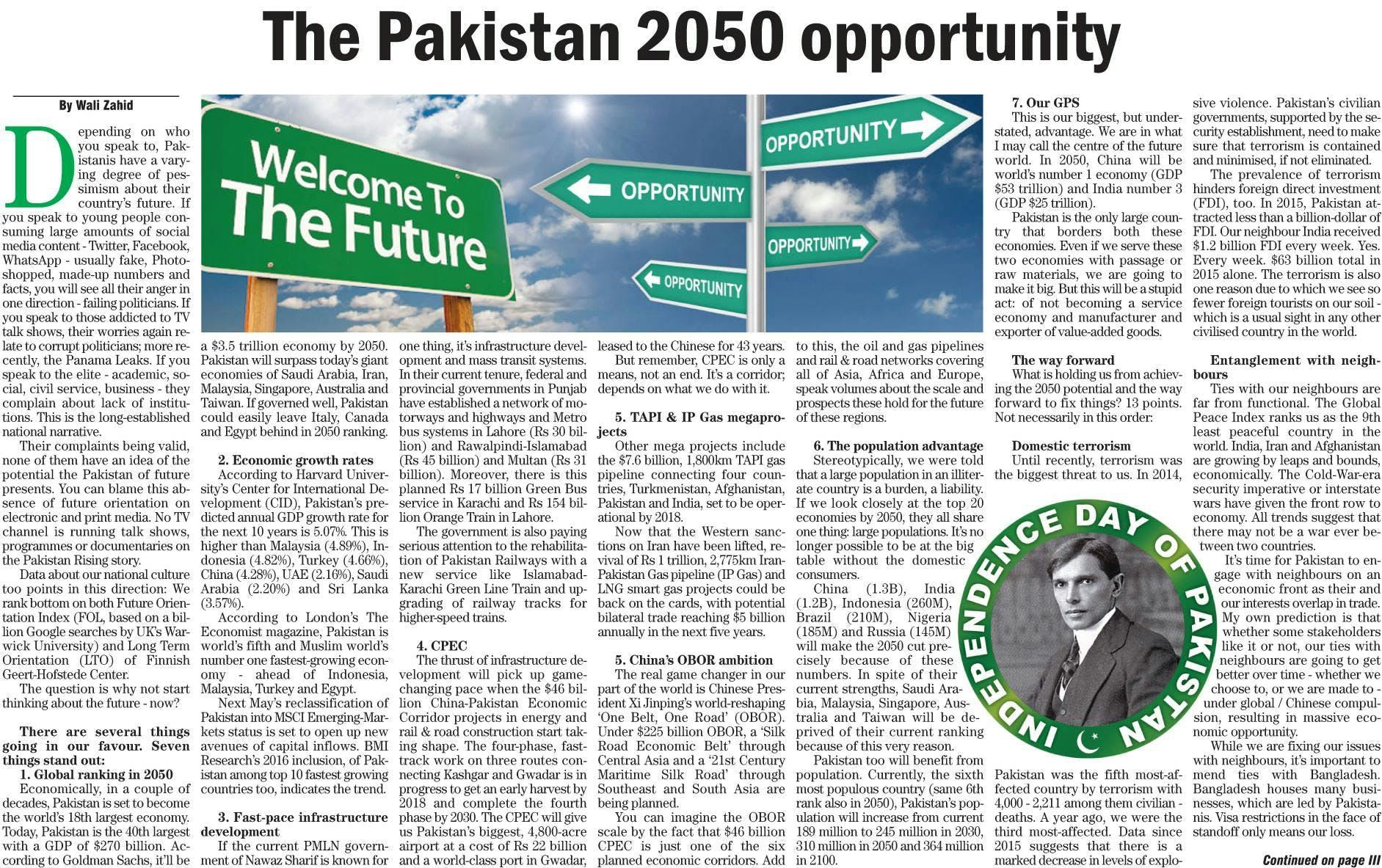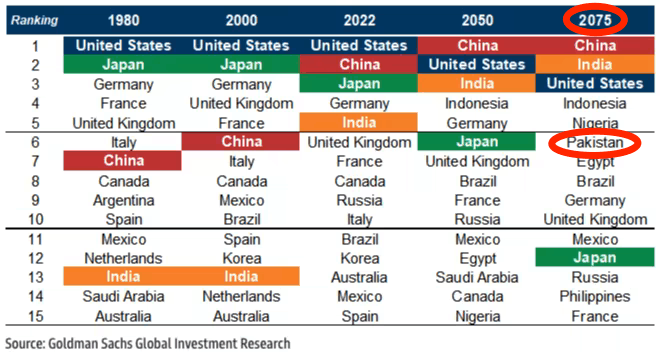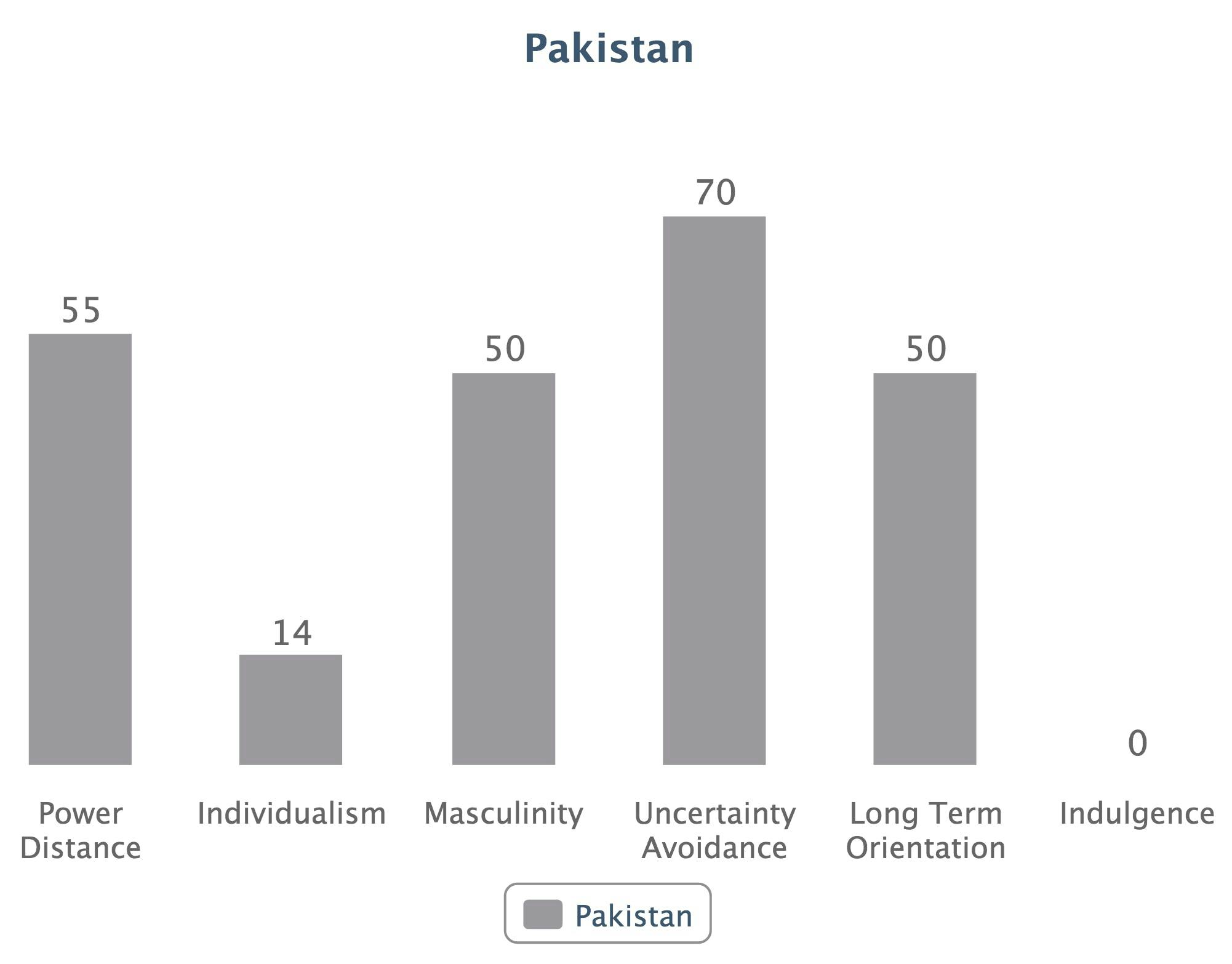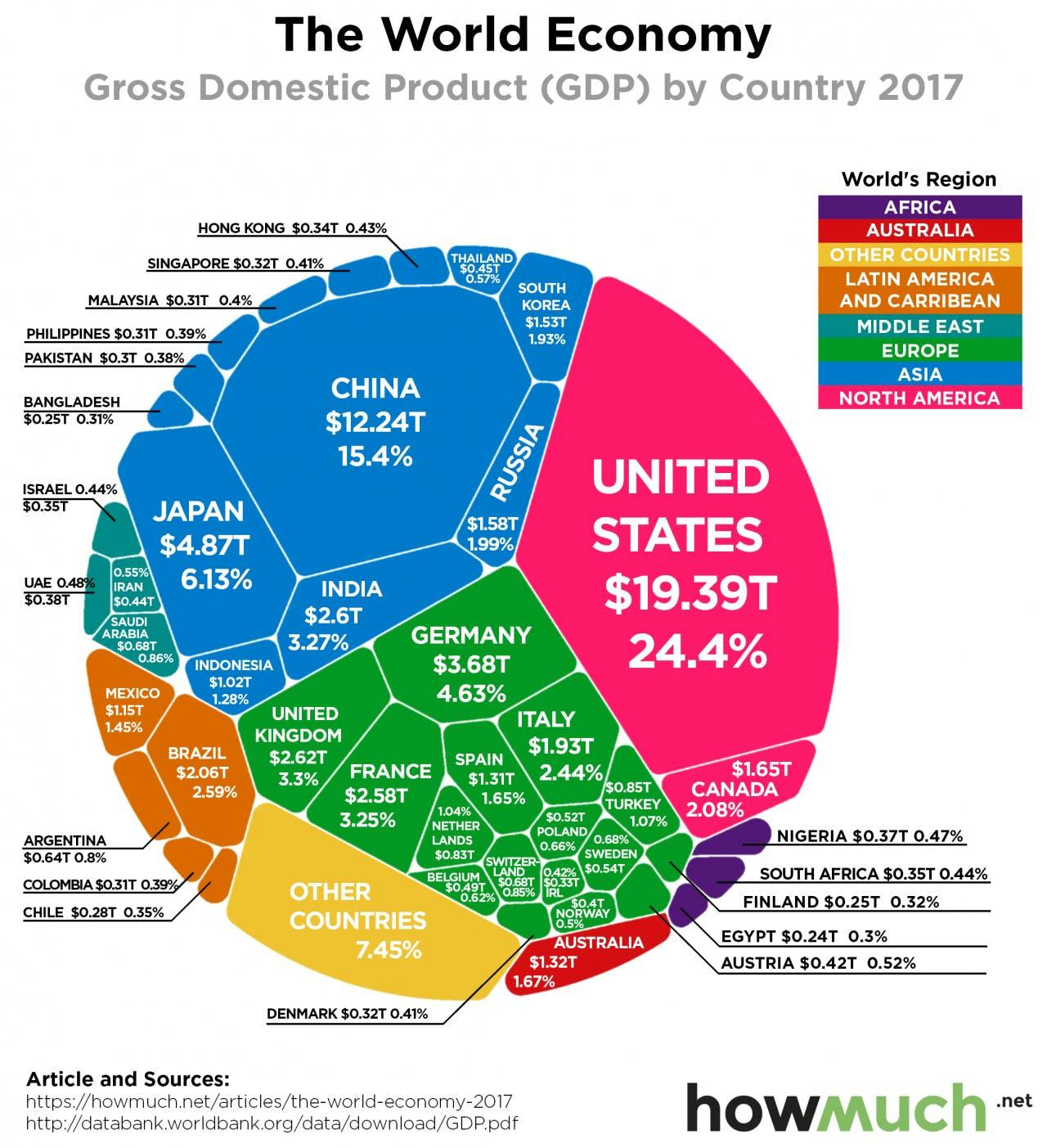Back to the future: Pakistan in 2050

Depending on who you speak to, Pakistanis have a varying degree of pessimism about their country’s future.
If you speak to young people consuming large amounts of social media content – Twitter, Facebook, WhatsApp – usually fake, Photoshopped, made-up numbers and facts, you will see all their anger in one direction – failing politicians.
If you speak to those addicted to TV talk shows, their worries again relate to corrupt politicians; more recently, the Panama Leaks.
If you speak to the elite – academic, social, civil service, business – they complain about lack of institutions.
This is the long-established national narrative.
Subscribe to our YouTube channel: Wali Zahid
Their complaints being valid, none of them have an idea of the potential the Pakistan of future presents. You can blame this absence of future orientation on electronic and print media. No TV channel is running talk shows, programmes or documentaries on the Pakistan Rising story.
Data about our past-oriented national culture too points in this direction: We rank bottom on both Future Orientation Index (FoI, based on a billion Google searches by UK’s Warwick University) and Long Term Orientation (LTO) of Finnish Geert-Hofstede Center.
The question is why not start thinking about the future – now?
What’s good about Pakistan
There are several things going in our favour. Eight things stand out:
1. Global ranking in 2050
Economically, in a couple of decades, Pakistan is set to become the world’s 18th largest economy by GDP. By GDP purchasing power parity, Pakistan will be 15th largest.
Today, Pakistan is the 40th largest with a GDP of $270 billion. According to Goldman Sachs, it’ll be a $3.5 trillion economy by 2050.
Pakistan will surpass today’s giant economies of Saudi Arabia, Iran, Malaysia, Singapore, Australia and Taiwan. If governed well, Pakistan could easily leave Italy, Canada and Egypt behind in 2050 ranking.
2. Economic growth rates
According to Harvard University’s Center for International Development (CID), Pakistan’s predicted annual GDP growth rate for the next 10 years is 5.07%.
This is higher than Malaysia (4.89%), Indonesia (4.82%), Turkey (4.66%), China (4.28%), UAE (2.16%), Saudi Arabia (2.20%) and Sri Lanka (3.57%).
According to London’s The Economist magazine, Pakistan is world’s fifth and Muslim world’s number 1 fastest-growing economy – ahead of Indonesia, Malaysia, Turkey and Egypt.
Next May’s reclassification of Pakistan into MSCI Emerging-Markets status is set to open up new avenues of capital inflows. Pakistan has already outperformed all 26 frontier and emerging stock markets in 2016.
BMI Research’s 2016 inclusion of Pakistan among top 10 fastest growing countries to add $4.3 trillion in next 10 years to global GDP too indicate the trend.
3. Fast-paced infrastructure development
If the current PMLN government of Nawaz Sharif is known for one thing, it’s infrastructure development and mass transit transport systems.
In their current tenure, federal and provincial government in Punjab have established a network of motorways and highways and Metro bus systems in Lahore (Rs 30 billion), Rawalpindi-Islamabad (Rs 45 billion) and Multan (Rs 29 billion).
Add to this the planned Rs 17 billion Green Line bus service in Karachi with federal money and Rs 154 billion Orange Line Metro Train in Lahore under CPEC.
The federal government is also paying serious attention to rehabilitation of Pakistan Railways with new services like Islamabad-Karachi Green Line Train and upgrading and dualisation of railway tracks for higher-speed trains with Chinese and ADB loans.
4. CPEC
The thrust of infrastructure development will pick up game-changing pace when the $46 billion China-Pakistan Economic Corridor projects in energy and rail & road construction start to take shape.
The four-phase, fast-track work on three road routes – Western, Central, Eastern – connecting Kashgar and Gwadar is in progress to get an early harvest by 2018 and complete the fourth phase by 2030.
The CPEC will give us Pakistan’s biggest, 4,800-acre airport at a cost of Rs 22 billion and a world-class port in Gwadar, leased to the Chinese for 43 years.
But remember, CPEC is only a means, not an end. It’s a corridor; depends on what we do with it.
5. TAPI & IP Gas mega projects
Other mega projects include the $10 billion, 1,800km TAPI gas pipeline connecting four countries – Turkmenistan, Afghanistan, Pakistan and India – set to be operational by 2020.
Now that the Western sanctions on Iran have been lifted, revival of Rs 1 trillion, 2,775km Iran-Pakistan Gas pipeline (IP Gas) and LNG smart gas projects could back be on the cards, with potential bilateral trade reaching $5 billion annually in five years.
6. China’s Belt and Road ambition
The real game changer in our part of the world is Chinese President Xi Jinping’s world-reshaping Belt and Road Initiative (BRI). Under $225 billion BRI, a ‘Silk Road Economic Belt’ through Central Asia and a ‘21st Century Maritime Silk Road’ through Southeast and South Asia are being planned.
You can imagine the scale of BRI by the fact that $46 billion CPEC is just one of the six planned economic corridors. Add to this the oil and gas pipelines and rail & road networks covering all of Asia, Africa and Europe.
7. The population advantage
Stereotypically, we had been told that a large population in an illiterate country is a burden, a liability.
If we look closely at the top 20 economies by 2050, they all share one thing: large populations. It’s no longer possible to be at the big table without the large domestic consumer base.
China (1.4B), India (1.3B), Indonesia (260M), Brazil (210M), Nigeria (185M) and Russia (145M) will make the 2050 cut precisely because of these numbers.
In spite of their current strengths, Saudi Arabia, Malaysia, Singapore, Australia and Taiwan will be deprived of their current ranking because of this very reason.
Pakistan too will benefit from population growth. Currently the sixth most populous country (same 6th rank also in 2050), Pakistan’s population will increase from current 189 million to 245 million in 2030, 310 million in 2050 and 364 million in 2100.
8. Our GPS
This is our biggest, but understated, advantage.
We are in what I may call the centre of the future world. In 2050, China will be world’s number 1 economy (GDP $53 trillion) and India number 3 (GDP $25 trillion).
Pakistan is the only large country that borders both these economies. Even if we are a sidekick and serve these two economies with safe passage or raw materials, we are going to make it big.
But this will be a stupid act: of not becoming a service economy and manufacturer and exporter of value-added goods. To a scale.
The way forward
What is holding us from achieving the 2050 potential and the way forward to fix things?
13 points. Not necessarily in this order:
1 Domestic terrorism
Until recently, terrorism was the biggest threat to us. In 2014, Pakistan was the fifth most-affected country by terrorism with 4,000 – 2,211 among them civilian – deaths. A year ago, we were the third most-affected.
Data since 2015 suggests that there is a marked decrease in levels of explosive violence. Pakistan’s civilian governments, supported by the security establishment, need to make sure that terrorism is contained and minimised, if not eliminated.
The prevalence of terrorism hinders foreign direct investment (FDI), too. In 2015, Pakistan attracted less than a billion-dollar of FDI. Our neighbour India received $1.2 billion FDI every week. Yes. Every week. $63 billion total in 2015 alone.
The terrorism is also one reason we see so fewer foreign tourists on our soil – which is a usual sight in any other civilised country in the world.
2 Entanglement with neighbours
Ties with our neighbours are far from functional. The Global Peace Index ranks us as 9th least peaceful country in the world. India, Iran and Afghanistan are making leaps economically.
The Cold-War-era security imperative or interstate wars have given the front row to economy. All trends suggest that there may not be a war ever between two countries.
It’s time for Pakistan to engage with neighbours on an economic front as their and our interests overlap in trade.
My own prediction is that whether some stakeholders like it or not, it’s only a matter of time that our ties with neighbours are going to get better – whether we choose to, or we are made to – under global or Chinese compulsion. Once rivalries are put behind, the region will abound with massive economic opportunity.
While we are fixing our issues with neighbours, it’s important to mend ties with Bangladesh. Bangladesh, set to receive $40 billion of Chinese investments, houses many businesses which are led by Pakistanis. Visa restrictions in the face of standoff only means our loss.
3 The worldview of us
It could not get any worse. Pakistani nationality is now ranked as the second least valuable in the world after Afghanistan.
In a 2016 Quality of Nationality Index (QNI) ranking of 161 nations, our passport is the second worst for international travel, with fewer than 25 unknown countries willing to grant us visa-free entry or allow us visa-on-arrival travel.
Again, for a nation of this huge economic potential, it does not make sense to have this kind of travel restriction for its citizens who need to do business all over the world.
4 Politically fragile climate
Pakistan ranks 14th on the Fragile States Index 2016.
The civil-military tension and need for control on national security, foreign policy and CPEC may mean this is likely to persist in coming years.
The political civil governments will continue to feel insecure in the face of military pressure for more space and control on economic resources.
5 Extremism and group violence
Our society is infested with all shades of extremism and group violence.
You see its expression on TV talk shows, in Twitter and Facebook newsfeed and on streets every day. All sense of moderation has purposefully been eliminated.
The government needs to work on this. We need to negotiate for our space with each other with civility. All public expression of encouraging people to use group violence needs to be a punishable crime.
6 Governance challenges
There are serious challenges facing our civilian institutions.
- Police needs to be reformed and upgraded so it can deal with crime effectively and also handle terrorism-related incidents and protect the lives of citizens during mass protests. It is critical that they are recruited fresh and trained in a new fashion to serve citizens and not to make money out of citizen misery or just to serve their masters.
Police upgrading is also necessary to save military from being required to manage crowds and terror targets and other civil emergencies.
- Civil service too is in need of dire reform. In fact, our entire national work ethic – lack of efficiency, lack of customer-orientation, lack of quality-orientation – needs to be reformed. The push needs to come from the top. It’s only when the Prime Minister and his / her cabinet members demonstrate these functioning behaviours, will a new national ethic emerge.
In the game of competing for global resources, executive speed and real-time decision-making is a no-brainer. FDI can be pulled to many destinations.
- Judiciary needs to find ways to manage 2-3 million+ case backlog, establish a new case management system and discourage frivolous litigation. For a country set to become 18th largest economy, current judicial management practices can only be a put-down. Judiciary also needs to deal with ‘some elements’ which consider themselves above the law. On merit. With courage.
7 Ease of Doing Business
A related challenge is our low, 144th ranking on World Bank’s Ease of Doing Business Index. We need to fix this – both for the Chinese and everyone else bringing in their FDI and also for local enterprises.
In a 2014 Pew survey, electricity shortages and crime emerged as two very big problems. The government needs to deal with both – as these impact businesses, too. Energy crisis and crime both require long-term solution, not just a quick fix.
8 Invisible monopolies
There are also invisible monopolies and barriers to entry – a kind of glass ceiling – for talented individuals and enterprises to break new ground.
Pakistan’s stakeholders need to loosen control and let it be a free-market economy for ambitious, aspiring and risk-oriented Pakistanis. This is the only way to achieve a global or regional scale.
9 Public-sector corruption
While our ranking on Transparency International’s Corruption Perceptions Index has improved in 2015 – CPI score 30 with a 9-point improvement in rank and one-point increase in score – we need to inculcate both an obligation among public servants not to take bribes or kickbacks, but also create a fear of law.
In our neighbourhood, President Xi’s China has recently sentenced two powerful generals and an ex-security chief for corruption and exchange of favours.
Equally worrying is petty bribes that are rampant in our culture.
We need to recreate a public-sector culture where taking or giving a bribe is an exception, not a norm.
We can learn from recent systemic initiatives of comparison economies like Nigeria, India and Indonesia where corruption had been endemic.
10 Public neglect
Corruption is one thing and public neglect is another. The latter too needs to be treated as a punishable crime.
Have you ever driven on a road inside Sindh or in its small or large cities? Or seen garbage all over megacity Karachi?
Government officials responsible for maintenance of roads and picking garbage need to be brought to public scrutiny and made to answer how we reached this level of shamble.
11 Social progress indices
Our low ranking on Human Capital Index, Global Innovation Index, Social Progress Index, Global Competitiveness Index, etc, leaves much to be desired.
The good thing about these yearly indices is that they break down key elements into an easy-to-fix prescription.
Not learning from other countries and neglecting their tried and tested wisdom can only result in our own peril.
12 Quality of university grads
The quality of our university teaching and resultant graduates is markedly below par.
Although we could be self congratulatory, only a handful of our universities show up in global top-1,000 ranking and we see very little impact of these graduates on the performance of local economy.
Education and health require both urgent and long-term attention and since a lot is written about these two issues, I am leaving them for another time.
13 Media regulation
Our mainstream broadcast, print and social media are part of the problem, not solution. The confusion they have created among the millions of rising youth is utterly deplorable.
Like a cartel, they have fixed all their eyes on certain types of issues – in news, current affairs and entertainment categories – as if there’s nothing else worthy of investigation and coverage.
Central issues which are going to hamper or help our future growth are kept outside the spectrum.
An example: When I share optimistic statistics about Pakistan’s future, all my readers – affluent, senior corporate executives – respond with disbelief negating my factual, authentic data.
Why? Because the mainstream media have only painted a picture of misery, gloom and hopelessness.
Perhaps there’s a need to run a Project Ignorance – to deal with misinformation on media. Misinformation too needs to become a crime punishable by law.
Hoping that in not too distant future, data like this shouldn’t be a surprise at all – not even for a layperson.
Tailpiece: In a 2015 PEW survey, over half of Pakistanis are now optimistic about their next generation that they will be better off than them.
This shows us a window of opportunity for a developed Pakistan 2050.
This is text version of Pakistan Independence Day lead page article that appeared in The News International, Pakistan’s largest-selling English-language newspaper, on 14 August 2016.

Wali Zahid
Wali Zahid is a longtime China watcher and a Pakistan futurist. An award-winning journalist, he writes on issues of significance to Pakistan and CPEC & BRI.
Related posts


